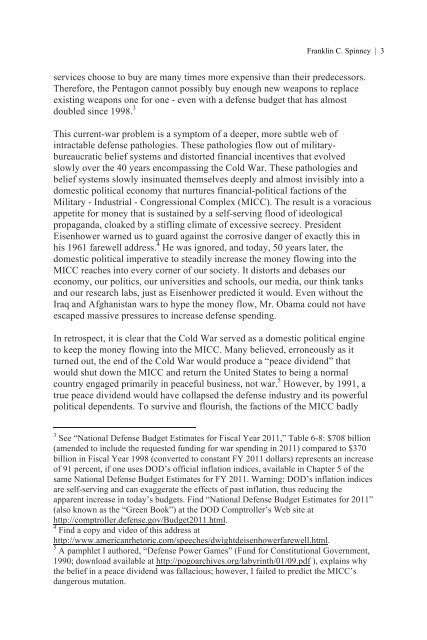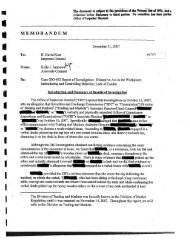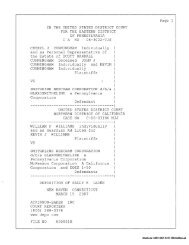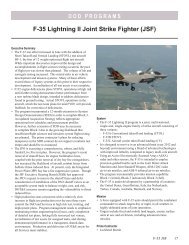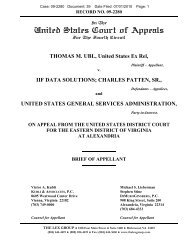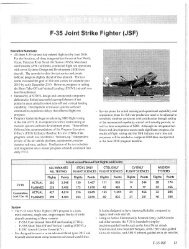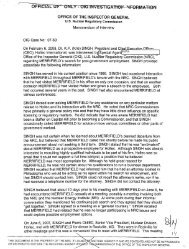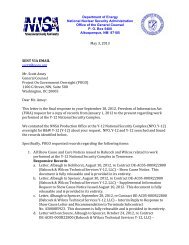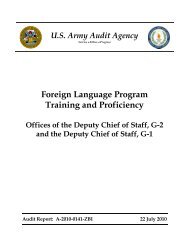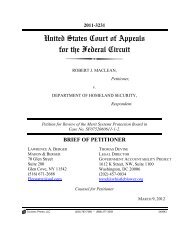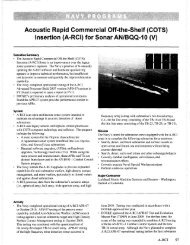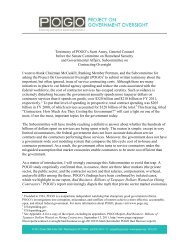The Pentagon Labyrinth
The Pentagon Labyrinth
The Pentagon Labyrinth
You also want an ePaper? Increase the reach of your titles
YUMPU automatically turns print PDFs into web optimized ePapers that Google loves.
Franklin C. Spinney | 3<br />
services choose to buy are many times more expensive than their predecessors.<br />
<strong>The</strong>refore, the <strong>Pentagon</strong> cannot possibly buy enough new weapons to replace<br />
existing weapons one for one - even with a defense budget that has almost<br />
doubled since 1998. 3<br />
This current-war problem is a symptom of a deeper, more subtle web of<br />
intractable defense pathologies. <strong>The</strong>se pathologies flow out of militarybureaucratic<br />
belief systems and distorted financial incentives that evolved<br />
slowly over the 40 years encompassing the Cold War. <strong>The</strong>se pathologies and<br />
belief systems slowly insinuated themselves deeply and almost invisibly into a<br />
domestic political economy that nurtures financial-political factions of the<br />
Military - Industrial - Congressional Complex (MICC). <strong>The</strong> result is a voracious<br />
appetite for money that is sustained by a self-serving flood of ideological<br />
propaganda, cloaked by a stifling climate of excessive secrecy. President<br />
Eisenhower warned us to guard against the corrosive danger of exactly this in<br />
his 1961 farewell address. 4 He was ignored, and today, 50 years later, the<br />
domestic political imperative to steadily increase the money flowing into the<br />
MICC reaches into every corner of our society. It distorts and debases our<br />
economy, our politics, our universities and schools, our media, our think tanks<br />
and our research labs, just as Eisenhower predicted it would. Even without the<br />
Iraq and Afghanistan wars to hype the money flow, Mr. Obama could not have<br />
escaped massive pressures to increase defense spending.<br />
In retrospect, it is clear that the Cold War served as a domestic political engine<br />
to keep the money flowing into the MICC. Many believed, erroneously as it<br />
turned out, the end of the Cold War would produce a “peace dividend” that<br />
would shut down the MICC and return the United States to being a normal<br />
country engaged primarily in peaceful business, not war. 5 However, by 1991, a<br />
true peace dividend would have collapsed the defense industry and its powerful<br />
political dependents. To survive and flourish, the factions of the MICC badly<br />
3 See “National Defense Budget Estimates for Fiscal Year 2011,” Table 6-8: $708 billion<br />
(amended to include the requested funding for war spending in 2011) compared to $370<br />
billion in Fiscal Year 1998 (converted to constant FY 2011 dollars) represents an increase<br />
of 91 percent, if one uses DOD’s official inflation indices, available in Chapter 5 of the<br />
same National Defense Budget Estimates for FY 2011. Warning: DOD’s inflation indices<br />
are self-serving and can exaggerate the effects of past inflation, thus reducing the<br />
apparent increase in today’s budgets. Find “National Defense Budget Estimates for 2011”<br />
(also known as the “Green Book”) at the DOD Comptroller’s Web site at<br />
http://comptroller.defense.gov/Budget2011.html.<br />
4 Find a copy and video of this address at<br />
http://www.americanrhetoric.com/speeches/dwightdeisenhowerfarewell.html.<br />
5 A pamphlet I authored, “Defense Power Games” (Fund for Constitutional Government,<br />
1990; download available at http://pogoarchives.org/labyrinth/01/09.pdf ), explains why<br />
the belief in a peace dividend was fallacious; however, I failed to predict the MICC’s<br />
dangerous mutation.


